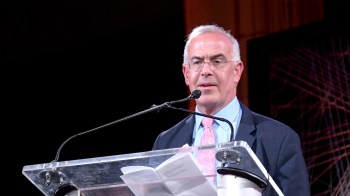Weekly Wrap: Tough times for markets
Tess Vigeland: It was a big week folks. A lot of long-awaited things happened. The president signed the economic recovery bill, also announced a new mortgage relief plan. The latest alleged Ponzi schemer, Allen Stanford, was caught. Oh, and the stock market continued to slide. Joining us for the weekly wrap on Wall Street and beyond is Andy Brooks, chief trader for T. Rowe Price. Hi, Andy.
Andy Brooks: Hi there.
Vigeland: And Heidi Moore, who is the lead writer for the Wall Street Journal’s “Deal Journal.” Hello again, Heidi.
Moore: Hi there.
Vigeland: So, Andy, let me start with you. How you doing?
Brooks: Well, I guess I’ve been better. It’s been a rough week. It’s been a rough start to the year and boy this market is challenging. And it’s challenging even the most positive among us.
Vigeland: Yeah. You know, we had all these economic relief plans out of Washington, D.C. What do investors want?
Brooks: Well, I think that’s probably a big part of the problem; They don’t know what they want. They want relief. They want certainty. They want to see light at the end of the tunnel. And obviously it’s an incredibly complicated process. And the economy is complicated. And the answers are not easy to find. What I think is somewhat challenging for us is people just aren’t willing to give the economy, or Mr. Geithner or Mr. Obama the benefit of the doubt. And we, we’ve got to sort of get on board here. The crisis in confidence continues and until we get comfortable knowing that we’re going to work through this, it’s a challenging time for investors.
Vigeland: Heidi, what do you think is going on here?
Moore: Well, I think, you know, it’s ever interesting the point that you make about how investors sort of need to give Geithner and Bernanke and Obama a little bit of time. I think they also need to distinguish themselves in showing that they have some sort of coherent plan in place. I mean, the problems of the last administration, when it came to this economic stimulus, was that everything was done in a very fly-by-night fashion and, you know, designed to, you know, control against the movements of the markets. You had a lot of weekend restructuring and weekend sales. And it just all felt very uncertain and very sloppy. And that has continued even into this year, under a new administration. And that just freaks people out.
Vigeland: And I wonder if there’s more than a little impatience going on here? I mean, we’re a month away from the year anniversary of Bear Stearns. It’s been six, seven months since Lehman Brothers, and we’re no better off than we were.
Moore: That’s exactly right. And really the core problem here is the core problem that has always been the case going back to 2007, well before Bear Stearns. It was always these toxic assets — these mortgage securities that are falling in value every day. Until you get those assets off the books at the banks, you really just — it might as well be 2007. Time hasn’t past.
Vigeland: Andy, there’s got to be something good we can look at here. Can you help us out?
Brooks: Well, here’s something that’s perhaps good. Roche, the global pharmaceutical company, did the biggest bond deal in the U.S. I think ever. They raised $16 billion. And that should suggest that parts of the market are functioning — things are happening, people are investing, people are thinking about asset classes and how to deploy monies into the markets. That, I hope, will have a positive impact at some point on the stock market. And I think Heidi’s right, we absolutely need to come up with some way to dispose of these toxic assets. The banks have got to see a way out, consumers have to see a way out, and investors have got to know that there’s something in place that’s going to start working. But it could be that the early signs of the fixed income market really starting to work pretty well might provide that opportunity.
Vigeland: How about you, Heidi? Any optimism?
Moore: To start with, with Andy’s point, I think is absolutely about the Roche bond sale. Pfizer was also able to raise $22.5 billion to buy Wyeth in another pharmaceutical deal. So there is a sign that the corporate credit markets are opening and that’s at least one part of the credit crunch that has eased up in the short term. There was a big IPO, so we have that as well. And then it just comes to perception, right. We always have this problem of perceptions. So, a lot of the banks have learned to deal with gossip when it happens, to absolutely be all over it, instead of standing back like at Bear Stearns or Lehman Brothers. For instance, Ken Lewis today, talking about nationalization and talking to his employees trying to comfort them, trying to pull the troops together, and saying “This is not going to happen and you need to know that.” Whereas, maybe in previous months, they just may have let that gossip go on.
Vigeland: Alright. Always good to wrap up the week on a, on a note of comfort. Andy Brooks and Heidi Moore, thanks so much.
Moore: Thank you.
Brooks: My pleasure. Thanks.
There’s a lot happening in the world. Through it all, Marketplace is here for you.
You rely on Marketplace to break down the world’s events and tell you how it affects you in a fact-based, approachable way. We rely on your financial support to keep making that possible.
Your donation today powers the independent journalism that you rely on. For just $5/month, you can help sustain Marketplace so we can keep reporting on the things that matter to you.


















